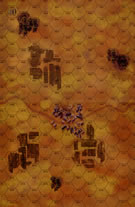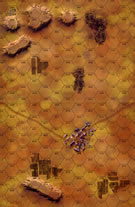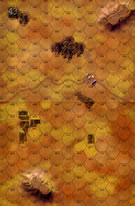|
Kempf IV: A Glimmer of Hope Burning Tigers #4 |
||
|---|---|---|
| (Attacker) Germany | vs | Soviet Union (Defender) |
| Formations Involved | ||
|---|---|---|
| Germany |  |
503rd "Feldherrnhalle" Heavy Panzer Battalion |
| Germany |  |
6th Panzer Division |
| Soviet Union |  |
31st Antitank Brigade |
| Soviet Union |  |
92nd Guards Rifle Division |
| Soviet Union |  |
96th Tank Brigade |

|
| Overall Rating, 7 votes |
|---|
|
4.57
|
| Scenario Rank: 7 of 957 |
| Parent Game | Burning Tigers |
|---|---|
| Historicity | Historical |
| Date | 1943-07-08 |
| Start Time | 12:30 |
| Turn Count | 20 |
| Visibility | Day |
| Counters | 167 |
| Net Morale | 0 |
| Net Initiative | 2 |
| Maps | 4: 40, 41, 42, 43 |
| Layout Dimensions | 86 x 56 cm 34 x 22 in |
| Play Bounty | 173 |
| AAR Bounty | 142 |
| Total Plays | 6 |
| Total AARs | 5 |
| Duplicates | KBT2004 |
| Battle Types |
|---|
| Delaying Action |
| Exit the Battle Area |
| Road Control |
| Urban Assault |
| Conditions |
|---|
| Minefields |
| Off-board Artillery |
| Reinforcements |
| Smoke |
| Scenario Requirements & Playability | |
|---|---|
| Burning Tigers | Base Game |
| Introduction |
|---|
|
Army Detachment Kempf bogged down and fell further and further behind schedule. With the stubborn defenders extracting a terrible toll from the Hitlerite invaders for each yard gained, things looked bleak to reverse this trend. Nevertheless, orders dictated another try, and as National Socialists they would obey or die trying. At the very least, they needed to reach Melikhovo today. |
| Conclusion |
|---|
|
The Germans satisfied their superiors by capturing Melikhovo, but they remained far behind schedule. The achievement of operational freedom of maneuver for the panzers required that the Lipouyi Donets River be crossed and the enemy near Belgorod be liquidated quickly. The Soviets had their own ideas about what was required. |
| AFV Rules Pertaining to this Scenario's Order of Battle |
|---|
|
| 6 Errata Items | |
|---|---|

|
The reduced direct fire value of the Heer HMG became 5-5 starting with Fall of France. (plloyd1010
on 2015 Jul 31)
|

|
The morale and combat modifiers of German Sergeant #1614 should be "0", not "8". (Shad
on 2010 Dec 15)
|

|
All SPW 251s have an armor value of 0. (Shad
on 2010 Dec 15)
|

|
Liberation 1944's Tiger movement and armor ratings are backwards. They should be Armor 7 and Movement 5. (petermc
on 2014 Feb 14)
|

|
There are alternate versions of the Tiger, available for download from Avalanche Press. Players might find it interesting to experiment on their effect on play. (plloyd1010
on 2024 Dec 19)
|

|
Kommissars never get morale or combat modifiers. Ignore misprints. (Shad
on 2010 Dec 15)
|
| First German failure | ||||||||||||
|---|---|---|---|---|---|---|---|---|---|---|---|---|
This cracking scenario played across 4 maps has a very strong German force including 5 platoons of Tigers attacking dug in Soviet forces with minefields and tank reinforcements on the way. The Soviet commander digs in on the Northern ridge with mines to the front on one flank and on the other put the majority of units in the large town on board 40 with mines scattered along the north south road. The German leader has three objectives needing any two for a minor win. The objectives are take all town hexes, clear one north-south road and exit 20 steps of the north edge. The exit 20 steps looks fairly easy to obtain using the PZIII and Hanomags, but the other two far harder and all three seem unlikely. In my game the Germans went for trying to clear the eastern north south road, just sending a diversionary force against the town. At game start the German force roll over the few Soviet forces left as road blocks with little difficulty, however the first ominous sign for the Germans was losing a TIGER step due to a very lucky shot from a dug in 76.2 artillery piece. Worse was to follow as accurate Soviet OBDA caused further casualties and delays to the German advance. The German Col rashly deciding that some real leadership was required at the front of the attack led the first wave of assaults in person against the Russian dug outs, this resulted in a mortal wound for the Col and further delayed the assault against the main Russian lines. There was now a bitter action along the ridge line as TIGER tanks threw themselves against the Red Army lines which held firm, although there were few TIGER losses the tankers morale was shaken and for almost 60 minutes the attack was held on the first line of Soviet defense. Meanwhile enough PZ111's and SPW's had gotten of the map for at least one objective to be met. However those forces may have been better used attacking the rear of the Soviet lines rather than exiting off at the first opportunity. The game now developed into a bit of a slug-fest on the ridge line with up to five assaults in progress over the the last few game turns. On the other flank the German forces had at last reached the towns outskirts but accurate ATR and HMG fire drove off the supporting INF and SPW's which meant that the town would have to be assaulted alone by AFV's including the FlamPZ's this was more in desperation than anything else and although Soviet losses were high (some due to the KOM who was not happy with some his gunners who fled from the advancing tanks) the German tankers were soon embroiled in desperate street fighting, Melikhovo would not fall today. On the ridge line the main Russian line had been breached, but Soviet units rushing from the other flank had now dug in along the road, as the last turn was reached the German commander through everything into some rather forlorn assaults in a last desperate effort to gain a victory but to no avail. The result a much needed Russian victory. Well this was a marvelous scenario which had a lot of action and some nail-biting moments with momentum swinging early to the Red Army then back again to the Wehrmacht, very tense even for a solitaire game. I rarely give a 5 in solo games but this scenario ticks all the boxes. |
||||||||||||
| 0 Comments |
| Germans score a major victory! | ||||||||||||
|---|---|---|---|---|---|---|---|---|---|---|---|---|
On July 8, 1943, General Breith, Commander of III Panzer Corps, ordered the 6th Panzer Division to move north toward Prokhorovka accompanied by units from 503 Panzer Abteilung at 1230 hours. The initial objectives were to break through the Soviet defenses, secure a north/south road in the area around Melikhovo, and take control of the town and two surrounding villages. Units from the Soviet 92nd Guards Rifle Division and 31st Anti-Tank Brigade formed a dug in defense both in town and along the hills east of the town. Soviet pickets were placed in some of the wooded areas and wheat fields south of the town, as well as in a small village SE of it. German armor and infantry advanced northward in force, along with long range artillery being called in with some accuracy. Soon after the battle began, German artillery destroyed a 45mm AT emplacement in the SE village. At 1300, Soviet armor reinforcements along with tank riders arrived on the northern front, while German infantry eliminated another Soviet AT platoon (76.2mm). German armor continued to strike at the Soviet front picket line inflicting infantry casualties and bursting through along the road to Melikhovo. By 1345, both a T-70 and T-34B had fallen to the German Tiger platoons as they drove toward Melikhovo; meanwhile, German PzIII’s and IV’s, a Grille and FPzIII attacked the Soviet troops in the SE village eliminating resistance from HMG and infantry platoons there. The FPzIII was lost in the skirmish, but the Germans took the village. The Germans then shifted the battle to the Soviet right flank in an attempt to secure the west N/S road and the town of Melikhovo, and vicious fighting occurred for the next hour. By 1515, the Soviet troops guarding the south side of Melikhovo put up a valiant defense, but resistance was beginning to crumble as they had no defense against the German armor other than direct assault. German Tigers and PzIIIJ’s eliminated the T-70’s that had been placed in the town. On the Soviet left, the Germans had firm control of the SE village, but a Kommissar bravely tried to rally the front line troops while Katyusha, mortar and artillery fire decimated German infantry en route to the village. By 1600, a German Tiger had taken the north village in the Soviet center; shortly thereafter, another Tiger destroyed the last remaining Soviet tank, a T-34C. At 1645, the German combined forces had captured the road running through Melikhovo, which gave them a clear thoroughfare from north to south on the battlefield. At 1515, a brave Soviet Major and his Guards infantry platoon were finally eliminated from Melikhovo, giving the Germans control of the town. By that time, 2 German Tigers, a PzIIIJ and a PzIIIN had moved north off the battlefield, giving the Germans a major victory. This is a complex scenario with many counters and a 4-map playing surface. The Germans need to exit 20 steps, secure a north/south road and control all town hexes for a major victory, while the Soviets need to prevent these three objectives from being attained. In the opening, the Germans held back most of the Hanomags and the Flammpanzers until it was clear where they would be most needed. HMG’s and engineers also held back until the Hanomags moved them forward to key areas. The Soviet placed dug-in units both on the ridges in the NE corner of the map and in Melikhovo, which was heavily defended. The German opening tested the front lines, but once it was clear the SE village could be secured, the majority of effort went to seize and clear the western N/S road and potentially take the prize of Melikhovo. The Germans had some good shots at the right time, which helped their cause, but the Tiger platoons are very difficult to tackle for the Soviets. There were attempts to catch them in a crossfire, but the firepower & range of the Tigers can damage any unit before it can get in range. The Germans also had the initiative in 18 of the 20 rounds, sometimes having three action segments before the Soviet could respond, other than for occasional opportunity fire. The only real break that the Soviets had involved the fog of war rules, since 11 of the 20 turns ended early; however, five of those 11 turns went through many action segments before they were stopped short. By the time of this scenario, I had stopped using the logistics rules; if these had been in play, the Soviets would have suffered two critical shortfalls. All things considered, this is a great scenario, but definitely a weekender. The tension level gets high, or at least it did in this example, as the Germans struggled to clear Melikhovo, which was the key for two of three objectives as played here. Regarding the third objective, only 4 of the 20 points were moved off the board prior to Turn 20. So, entering the last turn of the game, the Germans had only accomplished one objective, since they had a tenuous hold on the N/S road. Melikhovo was cleared on that last turn, and 16 German points then exited the map once secure perimeters were established around all towns, and the Soviet units that might threaten a late assault and compromise hex control were disabled to the point that they could not reach any of the town hexes. The latter situation is probably the most difficult for the Germans, since a “rogue” Soviet unit can make a last minute run to gain a road hex or enter for an assault to negate objective completion. Thus, the Germans not only have to have cleared all the road and town hexes, but must have a good blocking perimeter to insure that unchallenged control is maintained. |
||||||||||||
| 0 Comments |
| Hope Lives On | ||||||||||||
|---|---|---|---|---|---|---|---|---|---|---|---|---|
The Soviets are short handed so they make one strongpoint on the left and one on the right. The Germans threw everything at the left, to take the high ground and keep out of LOS of some Soviet units, degrading their firepower. The Soviets didn’t get their reinforcements until Turn 9, by which time the Germans had managed to use the Pzr III flame tanks to their utmost. The German Tigers were well positioned and they massacred the Soviet armor. The Germans cleared a corridor and exited 29 steps. German victory. |
||||||||||||
| 0 Comments |
| Inelegant but Sufficient | ||||||||||||||
|---|---|---|---|---|---|---|---|---|---|---|---|---|---|---|
To be honest about this scenario, my opponent and I started it, played about 5 turns, and found ourselves both willing to concede to the other... this meant a rematch. (In our first attempt at the game, the initial disposition of the Russians in an up-front and extremely personal defense caught my Germans completely unprepared for their mere presence so close to the German entrance points. I made gains around some of the Russian strongpoints, but they were going to wipe out my mortars and many of my weaker tanks with their infantry. Hence, my willingness to call the game early... but my opponent too felt that his dispositions would soon crumble and I would have a walk-off victory, albeit after 10 or so turns of nasty fighting...) So the rematch... The Russians pulled back quite a lot for this. They pretty much conceded the hilly board, knowing that I would avoid getting into a fight in those hills. This meant most of the fighting took place in and around the big town. In fact, the large force that I sent to capture the smaller of the big towns (on the German right flank), was the lynch pin in this victory. I never managed to turn the Russian flank on the left (in fact, I committed so few troops to that part of the fight that I was retreating by turn 15 on the left!). And the main task force I sent up the road to the bigger Russian town was holding its own, but not making any advances until the other task force had skirted the hills and come in against the Russians from the East. I probably would not have held the road- there were still too many Russians around!- but I did clear all the towns, and my troops were set to exit the board in fulfillment of the victory conditions when the game was called. I keep learning that my "task force" approach gets me into a lot of trouble when I play the Germans. I need to work on flexibility... |
||||||||||||||
| 0 Comments |
| Kursk: Burning Tigers: scenario #4: Kempf IV: A Glimmer of Hope | ||||||||||||
|---|---|---|---|---|---|---|---|---|---|---|---|---|
Kursk: Burning Tigers: scenario #4: Kempf IV: A Glimmer of Hope Returning to the Battle of Kursk, I picked this one out of the scenario line-up, even though I still want to play scenario 38. The Germans have three objectives and I started with trying to control the town hexes first, kind of dividing my forces into two groups, half in the east and half in the west, at least until I can control the two larger cities. Both sides lost a lot of units, the German more on the approaches to the larger towns and then in assaults, followed by the Soviet armor counter-attack, which happened about turn 8 or 9. The Germans lost only one Tiger step to a Soviet 76.2mm gun, which rolled a 12 on the dice, it was bound to happen with so many Soviet gun emplacements. But overall the Soviets suffered the worst of it, losing all the town hexes and one north-south road. The German avoided the north-south road in the east that went through the hills, as it looked to painful to attempt. They also didn’t have time to exit 20 steps off the north edge of the map, as they had to keep control of the one north-south road in the west and all the town hexes, and there were still too many Soviet stragglers around the battlefield, so the Germans decided on only two victory objects, gaining them a Minor Victory. |
||||||||||||
| 0 Comments |

 KRBT003
KRBT003 














































